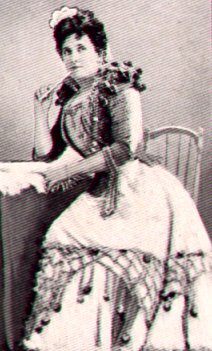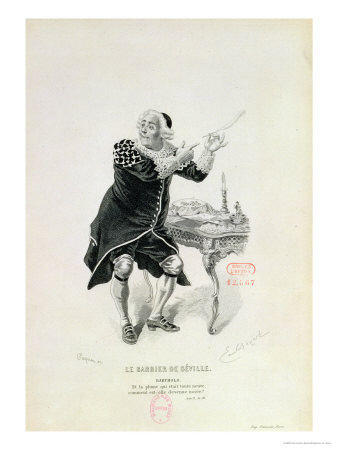Music with Ease > 19th Century Italian Opera > The Barber of Seville (Rossini)
The Barber of Seville
(Italian title: Il Barbiere di Siviglia)
An Opera by Gioacchino Antonio Rossini
The ardent Count Almaviva has fallen in love with Rosina, the pretty ward of Doctor Bartolo, who wants to marry her himself. So far, Almaviva is known to her only under the assumed name of Lindoro. After a serenade and an exchange of letters, he disguises himself as a tipsy dragoon, and manages to get into Bartolo’s house by aid of the factotum Figaro. But his stratagem is foiled by the entrance of the guard, who arrest the would-be wooer and carry him to gaol. In the second Act he appears as Deputy for Basilio, the singing-master, said to be sick. In order, however, to gain the suspicious Bartolo’s confidence, he produces one Rosina’s letters to himself, declaring that it was given him by a mistress of Almaviva. Bartolo thinks he will inflame Rosina’s jealousy by telling the scandal to Rosina, whose disappointment nearly frustrates Almaviva’s deep-laid schemes. Happily, Almaviva secures an interview with Rosina, convinces her of his constancy, and induces her to elope before Bartolo discovers the trick that has been played upon him.

The Australian operatic soprano Nellie Melba as Rosina in Rossini's The Barber of Seville. This photo was taken around 1920.
The music of this immortal work is too well known to required detailed analysis. It exhibits the composer in his gayest and most exhilarating mood, and sparkles with wit and fancy. Amongst his most familiar numbers are the Count’s serenade, Figaro’s celebrated description of his various duties, Basilio’s plotting aria, Rosina’s chamber aria, the ingenious dragoon finale of first Act, and the music-lesson. The delicate trio, "Zitti Zitti," is a much-appreciated number; but the melody of this is taken, note for note, from Simon’s air in Haydn’s "Seasons." The overture, as now played, was not originally composed for the opera, but had done varied service in other directions.
Rossini wrote "The Barber" to the commission of the manager of the Argentina Theatre, at Rome, where it was first produced in February 1816. According to contract, it had to be finished by a very near date, and for thirteen days poet and composer had scarcely time to eat, while they slept -- on a sofa -- only when they could no longer keep their eyes open. Rossini did not even stop to shave, and when some wit remarked on the strange fact the that "The Barber" should cause him to let his beard grow, he replied that to get shaved meant going out, and if he went out he would not return so soon as he ought. The statement, frequently made, that the entire opera was written in thirteen days is doubtfully correct, but the time was certainly within a month. Rossini declared that he received just £60 from the Argentina for the work. That sum did not compensate him, he said, for the agony he endured at the premiere.
The "agony" was probably not acute, for Rossini took such things very philosophically. But assuredly there was cause for agony. It so happened that Paisiello, a living composer in good local repute, had made an opera on the same subject thirty-six years before; and his admirers would not forgive the young Rossini for presuming to do better, or even differently. It was said that Paisiello looked confidently forward to Rossini’s failure, and was even prepared to help towards it himself. At any rate, the audience came primed for a row.
Circumstances were on their side. First, and apart from their allegience to Paisiello, they were used in the way of buffo music to the style in which the pathetic often mingles with and sometimes effaces the comic. Then, to make matters worse, Rossini wore a coat the texture and colour of which displeased them -- a kind of vicuna. Again, when Almaviva enter to sing his serenade to Rosina, all the strings on his guitar snapped. A few minutes later, the like mishap befell Figaro’s instrument; and instead of tripping sedately on to the stage, Basilio made his entrance head foremost. Picking himself up, he made the mistake of wiping the blood flowing from his nose with his gown.
As if this were not enough, the finely built concerted piece which closes the first Act was just beginning when a cat appeared on the stage. Chased in one direction by Figaro, in another by Bartolo, in a third by Basilio, the animal, in a wild endeavour to escape, ran into the skirt of Rosina’s dress. In a word, the cat and not the music received the attention of the audience, who laughed uproariously. Then the storm broke; but instead of bowing his head to it, Rossini rose from the piano at which composers then presided, and not only applauded his interpreters, but with a gesture asked the audience to do the same! The whole thing ended in hissing and hooting. But Rossini remained perfectly calm. He went home to bed, and, when the principal singers called in half-an-hour, he was fast asleep.
At the second performance, "The Barber" was comparatively well received. Being then actually heard, it was naturally admired. After a few representations it began to excite enthusiasm, and in a little over a week it was being received nightly with "frantic applause." By-and-by it not only took the musical world by storm, but it has kept the stage to the present day, though its appearances are few and far between.
THE BARBER OF SEVILLE POSTER

Dr Bartolo, from the Opera "The Barber of Seville" by Rossini
Size: 18 in x 24 in.
Giclee Print.
Buy at AllPosters.com
Music With Ease | About Us | Contact Us | Privacy | Sitemap | Copyright | Terms of Use © 2005-25 musicwithease.com. All Rights Reserved. |
